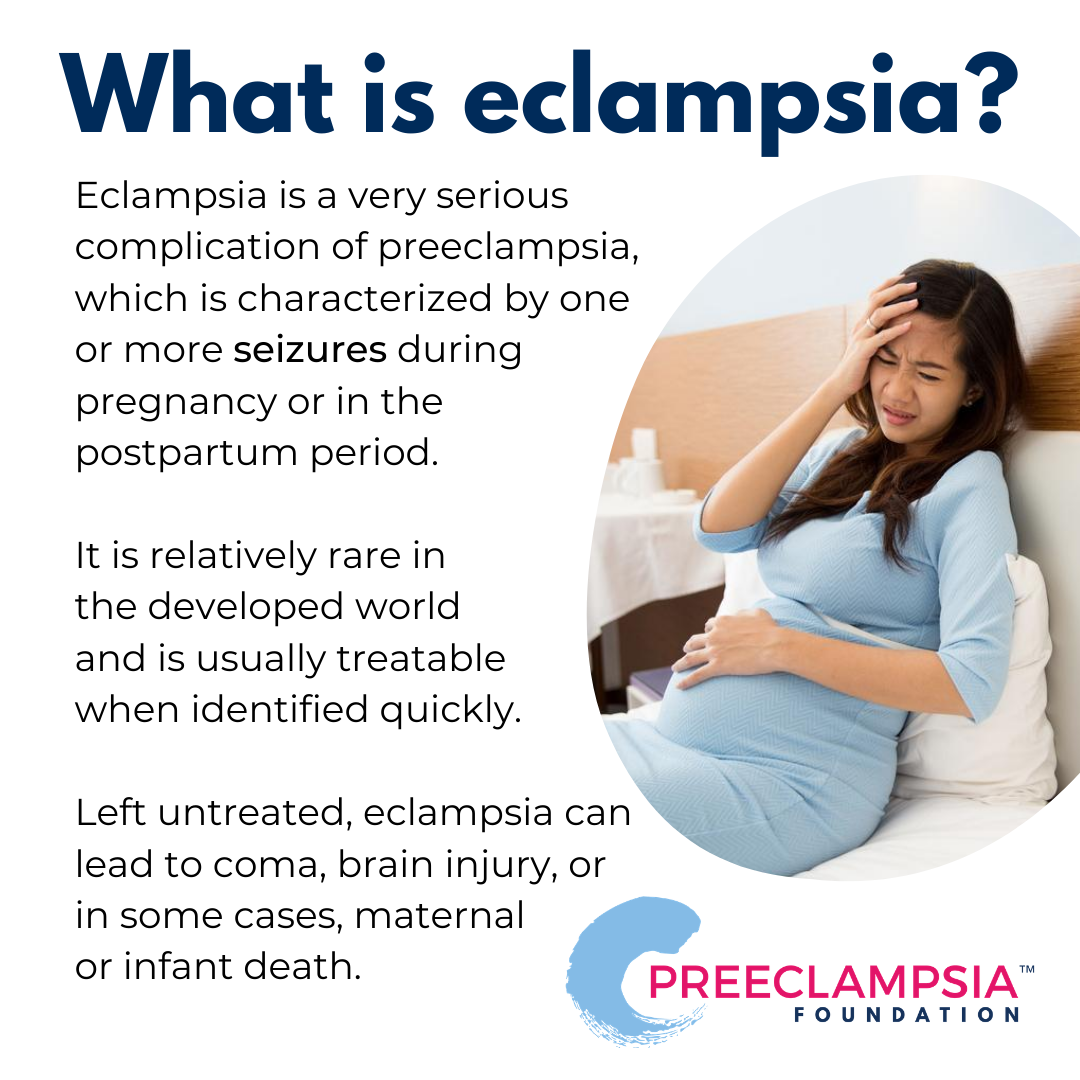
What is eclampsia?
Last Updated on August 08, 2025
Eclampsia is a very serious complication of preeclampsia with one or more seizures during pregnancy or in the postpartum period. In the developed world, eclampsia is rare and usually treatable, if appropriate intervention is promptly sought. Left untreated, eclamptic seizures can result in coma, brain damage, and possibly maternal or infant death.
What is eclampsia?
Eclampsia (e-CLAMP-si-a) is a very serious complication of preeclampsia characterized by one or more seizures during pregnancy or in the postpartum period. In the developed world, eclampsia is rare and usually treatable if appropriate intervention is promptly sought. Left untreated, eclamptic seizures can result in coma, brain damage, and possibly maternal or infant death. Eclampsia has been recognized clinically for over 2,000 years, since the time of Hippocrates. The Greek physician Celsus described pregnancy-associated seizures that disappeared after delivery of the baby. Because these symptoms emerged without any warning signs, the condition was named 'eclampsia', the Greek word for 'lightning'. We now understand that these seizures were triggered by the presence of high blood pressure, or preeclampsia. It's important to note that eclampsia can occur during pregnancy or the postpartum period, even without warning signs like high blood pressure.

Is eclampsia related to preeclampsia?
Preeclampsia is so named because it was originally identified as a disorder preceding "eclampsia" or seizures during pregnancy and the postpartum period. It is now known that eclamptic seizures are only one of the several potential complications of the disease. Eclamptic seizures usually occur as a later complication of severe preeclampsia, but may also arise without any prior signs of severe disease.
What are the signs and symptoms of eclampsia?
The main sign of eclampsia is seizures during pregnancy, but is often accompanied by high blood pressure readings. Report to your care provider if you experience symptoms of severe headache and visual changes like spots, floaters, or difficulty seeing during pregnancy or the postpartum period, as these may be indications of high blood pressure and changes to your central nervous system. Familiarize yourself with all the signs and symptoms of preeclampsia, as any may indicate the presence of high blood pressure.
How is eclampsia treated?
Magnesium sulfate (given intravenously) is the treatment of choice for severe preeclampsia to prevent eclampsia, or after eclampsia develops to prevent more seizures. Many, but not all, providers will also treat every preeclamptic patient with magnesium sulfate during labor, even when the disease may only have mild features. Eclampsia can occur even without the presence of severe preeclampsia symptoms. Magnesium treatment is generally continued for 24-48 hours after the last seizure or beyond delivery. You may receive magnesium sulfate in an intensive care unit or a labor and delivery unit. While magnesium is given you will be observed closely, receive intravenous fluids, and may have a catheter placed in your bladder to measure urine output.
Magnesium sulfate can be used by a skilled healthcare provider with appropriate support facilities. Overdoses can occur and lead to harm to your kidneys, so you should be closely monitored.
Side effects of magnesium sulfate may include drowsiness, redness, flushing or overheating, muscle fatigue or weakness, dizziness, and trouble concentrating. Symptoms typically go away shortly after the medication is stopped. Its use can be very uncomfortable, but your provider hs likely included it in your treatment to prevent a worse outcome - seizures.
Magnesium sulfate has often been compared to Epsom salts, but ingesting Epsom salts and/or magnesium vitamin supplements have not been shown to prevent maternal death due to eclamptic seizures. Magnesium levels achieved with oral therapy are not sufficient to prevent seizures. The medication should be through an IV.
For more about preeclampsia, eclampsia, or HELLP syndrome, please see our Frequently Asked Questions.
Have a question? Ask us here.
Related Articles

Ánimo y cuídate: la preeclampsia puede estar asociada con enfermedades cardíacas y accidentes cerebrovasculares más adelante en la vida Descargue nuestra hoja informativa

La preeclampsia, en todas sus formas, puede requerir muchos análisis, tanto durante como después del embarazo. ¿Alguna vez se preguntó por qué el proveedor de atención médica le solicita tantos anális...

El embarazo es un momento ideal para familiarizarse con su presión arterial. Aquí encontrará todo lo que necesita saber sobre cómo tomarse la presión arterial en casa.

Though the Centers for Disease Control and Prevention (CDC) have recently lifted many of the recommended COVID restrictions, COVID-19 infection increases risk of developing life-threatening hypert...

Melbourne, FL – October 7, 2025 – The Preeclampsia Foundation launched two new educational resources to help expectant moms and their providers better understand the growing field of predi...

Melbourne, FL – September 17 , 2024 – The Preeclampsia Foundation, in partnership with the International Society for the Study of Hypertension in Pregnancy (ISSHP) and Society for Ma...

Resultados de varios estudios apoyan la hipótesis de que el estrés causado por un embarazo y parto traumáticos puede en muchas ocasiones anular la habilidad de salir adelante emoc...

Is there a connection between maternal diet and preeclampsia? The PRECISE Network research team and I recently completed an evidence review to compile information on maternal nutritional factors that...

What you’ll learn in this article: Many risk factors contribute to an individual’s chance of getting preeclampsia. These risk factors may be genetic, physical, environmental, and even s...

